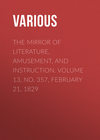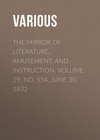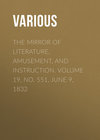Loe raamatut: «The Mirror of Literature, Amusement, and Instruction. Volume 13, No. 357, February 21, 1829», lehekülg 2
THE NECK. 7
A SWEDISH TRADITION
(For the Mirror.)
His cheek was blanch'd, but beautiful and soft, each curling tress
Wav'd round the harp, o'er which he bent with zephyrine caress;
And as that lyrist sat all lorn, upon the silv'ry stream,
The music of his harp was as the music of a dream,
Most mournfully delicious, like those tones that wound the heart,
Yet soothe it, when it cherishes the griefs that ne'er depart.
"O Neck! O water-spirit! demon, delicate, and fair!"
The young twain cried, who heard his lay, "why art thou harping there?
Thine airy form is drooping, Neck! thy cheek is pale with dree,
And torrents shouldst thou weep, poor fay, no Saviour lives for thee!"
All mournful look'd the elflet then, and sobbing, cast aside
His harp, and with a piteous wail, sunk fathoms in the tide.
Keen sorrow seiz'd those gentle youths, who'd given cureless pain—
In haste they sought their priestly sire, in haste return'd again;
Return'd to view the elf enthron'd in waters as before,
Whose music now was sighs, whose tears gush'd e'en from his heart's core.
"Why weeping, Neck? look up, and clear those tearful eyes of blue—
Our father bids us say, that thy Redeemer liveth too!"
Oh, beautiful! blest words! they sooth'd the Nikkar's anguish'd breast,
As breezy, angel-whisperings lull holy ones to rest.
He seiz'd his harp—its airy strings, beneath a master hand,
Woke melodies, too, too divine for earth or elfin land;
He rais'd his glad, rich voice in song, and sinking saw the sun,
Ere in that hymn of love he paus'd, for Paradise begun!
M.L.B.
PLAN FOR SNUFF TAKERS TO PAY OFF THE NATIONAL DEBT
(For the Mirror.)
As snuff-taking seems to increase, the following plan might be adopted by the patrons of that art, to ease John Bull of his weight, and make him feel as light and easy, as if he had taken a pinch of the "Prince Regent's Mixture.'"
Lord Stanhope says, "Every professed, inveterate, and incurable snuff-taker, at a moderate computation, takes one pinch in ten minutes. Every pinch, with the agreeable ceremony of blowing and wiping the nose, and other incidental circumstances, consumes a minute and a half. One minute and a half out of every ten, allowing sixteen hours and a half to a snuff-taking day, amounts to two hours and twenty-four minutes out of every natural day, or one day out of every ten. One day out of every ten amounts to thirty-six days and a half in a-year. Hence, if we suppose the practice to be persisted in forty years, two entire years of the snuff-taker's life will be dedicated to tickling his nose, and two more to blowing it. The expense of snuff, snuff-boxes, and handkerchiefs, will be the subject of a second essay, in which it will appear, that this luxury encroaches as much on the income of the snuff-taker as it does on his time; and that by a proper application of the time and money thus lost to the public, a fund might be constituted for the discharge of the national debt."
Queries.—Is not this subject worthy the attention of the finance committee? Might not the cigar gentlemen add to the discharge of the debt?
P.T.W.
THE DIVIDED HOUSEHOLD
(For the Mirror.)
Our hearth—we hear its music now—to us a bower and home;
When will its lustre in our souls with Spring's young freshness come?
Sweet faces beam'd around it then, and cherub lips did weave
Their clear Hosannas in the glow that ting'd the skies at eve!
Oh, lonely is our forest stream, and bare the woodland tree,
And whose sunny wreath of leaves the cuckoo carolled free;
The pilgrim passeth by our cot—no hand shall greet him there—
The household is divided now, and mute the evening pray'r!
Amid green walks and fringed slopes, still gleams the village pond.
And see, a hoar and sacred pile, the old church peers beyond;
And there we deem'd it bliss to gaze upon the Sabbath skies,—
Gold as our sister's clustering hair, and blue as her meek eyes.
Our home—when will these eyes, now dimm'd with frequent weeping, see
The infant's pure and rosy ark, the stripling's sanctuary?
When will these throbbing hearts grow calm around its lighted hearth?—
Quench'd is the fire within its walls, and hush'd the voice of mirth!
The haunts—they are forsaken now—where our companions play'd;
We see their silken ringlets glow amid the moonlight glade;
We hear their voices floating up like pæan songs divine;
Their path is o'er the violet-beds beneath the springing vine!
Restore, sweet spirit of our home! our native hearth restore—
Why are our bosoms desolate, our summer rambles o'er?
Let thy mild light on us be pour'd—our raptures kindle up,
And with a portion of thy bliss illume the household cup.
Yet mourn not, wanderers—onto you a thrilling hope is given,
A tabernacle unconfin'd, an endless home in heaven!
And though ye are divided now, ye shall be made as one
In Eden, beauteous as the skies that o'er your childhood shone!
Deal.
REGINALD AUGUSTINE.
A CHAPTER ON KISSING
BY A PROFESSOR OF THE ART
(For the Mirror.)
"Away with your fictions of flimsy romance,
Those tissues of falsehood which folly has wove;
Give me the mild gleam of the soul breathing glance,
And the rapture which dwells in the first kiss of love."
BYRON.
There is no national custom so universally and so justly honoured with esteem and respect, "winning golden opinions from all sorts of people," as kissing. Generally speaking, we discover that a usage which finds favour in the eyes of the vulgar, is despised and detested by the educated, the refined, and the proud; but this elegant practice forms a brilliant exception to a rule otherwise tolerably absolute. Kissing possesses infinite claims to our love, claims which no other custom in the wide world can even pretend to advance. Kissing is an endearing, affectionate, ancient, rational, and national mode of displaying the thousand glowing emotions of the soul;—it is traced back by some as far as the termination of the siege of Troy, for say they, "Upon the return of the Grecian warriors, their wives met them, and joined their lips together with joy." There are some, however, who give the honour of having invented kissing to Rouix, or Rowena, the daughter of Hengist, the Saxon; a Dutch historian tells us, she, "pressed the beaker with her lipkens (little lips,) and saluted the amorous Vortigern with a husgin (little kiss,)" and this latter authority we ourselves feel most inclined to rely on; deeply anxious to secure to our fair countrywomen the honour of having invented this delightful art.
Numberless are the authors who have written and spoken with rapture on English kissing.
"The women of England," says Polydore Virgil, "not only salute their relations with a kiss, but all persons promiscuously; and this ceremony they repeat, gently touching them with their lips, not only with grace, but without the least immodesty. Such, however, as are of the blood-royal do not kiss their inferiors, but offer the back of the hand, as men do, by way of saluting each other."
Erasmus too—the grave, the phlegmatic Erasmus, melts into love and playful thoughts, when he thinks of kisses—"Did you but know, my Faustus," he writes to one of his friends, "the pleasures which England affords, you would fly here on winged feet, and if your gout would not allow you, you would wish yourself a Dædalus. To mention to you one among many things, here are nymphs of the loveliest looks, good humoured, and whom you would prefer even to your favourite Muses. Here also prevails a custom never enough to be commended, that wherever you come, every one receives you with a kiss, and when you take your leave, every one gives you a kiss; when you return, kisses again meet you. If any one leaves you they give you a kiss; if you meet any one, the first salutation is a kiss; in short, wherever you go, kisses every where abound; which, my Faustus, did you once taste how very sweet and how very fragrant they are, you would not, like Solon, wish for ten years exile in England, but would desire to spend there the whole of your life."
Oh what miracles have been wrought by a kiss! Philosophers, stoics, hermits, and misers have become men of the world, of taste, and of generosity; idiots have become wise; and, truth to tell, wise men idiots—warriors have turned cowards and cowards brave—statesmen have become poets, and political economists sensible men. Oh, wonderful art, which can produce such strange effects! to thee, the magic powers of steam seem commonplace and tedious; the wizard may break his rod in despair, and the king his sceptre, for thou canst effect in a moment what they may vainly labour years to accomplish. Well may the poet celebrate thy praises in words that breathe and thoughts that burn; well may the minstrel fire with sudden inspiration and strike the lute with rapture when he thinks of thee; well might the knight of bygone times brave every danger when thou wert his bright reward; well might Vortigern resign his kingdom, or Mark Antony the world, when it was thee that tempted. Long, long, may England be praised for her prevalence of this divine custom! Long may British women be as celebrated for the fragrance of their kisses, as they ever were, and ever will be for their virtue and their beauty.
CHILDE WILFUL.




















